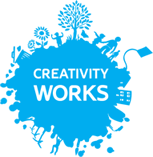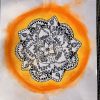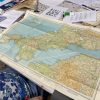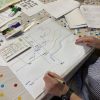News
Putting People First: using the social model of disability
Our Artists Development Manager Stacey Pottinger explains how the social model of disability is used in our training programmes, and the importance of putting people first.
At Creativity Works we use the social model of disability. This means we acknowledge that “people are disabled by barriers in society, not by their impairment or difference,” (Scope, Social Mode of Disability). Environments, organisations and attitudes cause inaccessibility for disabled and neurodivergent people and asking for adjustments can be a barrier in itself. With this in mind, we created a training and support programme for people who are currently unemployed and who would like to access education, training, volunteering and employment opportunities.
From the beginning we worked with our partners and workshop leads to ensure participants didn’t need to ask for adjustments during sessions, and measures were already in place to ensure participants can access any part of what they are being offered. The individual workshops enable participants to build confidence, skills and resilience, and the programme gently builds in intensity and opportunity to grow capacity and progress participants into further training, volunteering or work.
People with pre-existing/long-term health conditions were one of the groups most affected by the pandemic. This includes income, access to employment and mental health challenges, which is why we have made considerable efforts to support people. From when we began in April 2022 to the end of the programme we will have empowered 17 people who are disabled, have long term physical health conditions, mental health challenges and/or have faced additional barriers to access due to gender or racial bias to progress into volunteering opportunities, training and self-employment. Whilst we might not always get it right, when we do it has an enormous impact on the participants.
“making the sessions so accessible is what broke the cycle of isolation due to my disability. Participation gave me joy and feelings of happiness…. I felt respected and heard, motivated, and inspired. The sessions helped me be in touch again with my own skills and capabilities.” – Sally
“a course which is only skills focused doesn’t always encourage you to feel part of a group. It felt warm and welcoming.” – Chloe
Sally is about to run her very first workshop about Self Compassion with Creativity Works in the next few weeks, with plans to become a self-employed facilitator in the future. Chloe is in the process of setting up a new creative business with support from Cool Ventures. This progression is a key part of the programme, and we support all participants with their next steps. Many have gone onto other training or are now working as volunteers in the charity and creative sectors, and others are being offered mentoring and support to develop their business plans to become self-employed or attend University.
Creativity was at the heart of this programme. It provided a way to problem solve, communicate and express things that would otherwise be difficult. In one session it helped participants to discover and plan for the barriers to the goals they had. Participants mapped the journey to their goals in a way that suited them, and the results were vastly different but equally effective.
The West of England Combined Authority (WECA) has been an enormous support of our people-centred approach, and their funding has allowed us to create a supportive and accessible programme that has helped so many people into work and training.
We also worked alongside fantastic partners for this programme: Bath Spa, Youth Connect South West, St Mungos, Natural Theatre Company, B in Bath, Genesis Trust, Avon and Wiltshire Mental Health Partnership, Big Issue and the Julian House Refugee Resettlement Scheme.
Finally, we wouldn’t have been able to offer the wide range of opportunities without our wonderful artists and creatives including Adrian Wyatt, Sayambrita Muckerjee, Joseph Wilks, Dave Webb, Christina Sanders, Michael Loveday and Kerry Russell.



